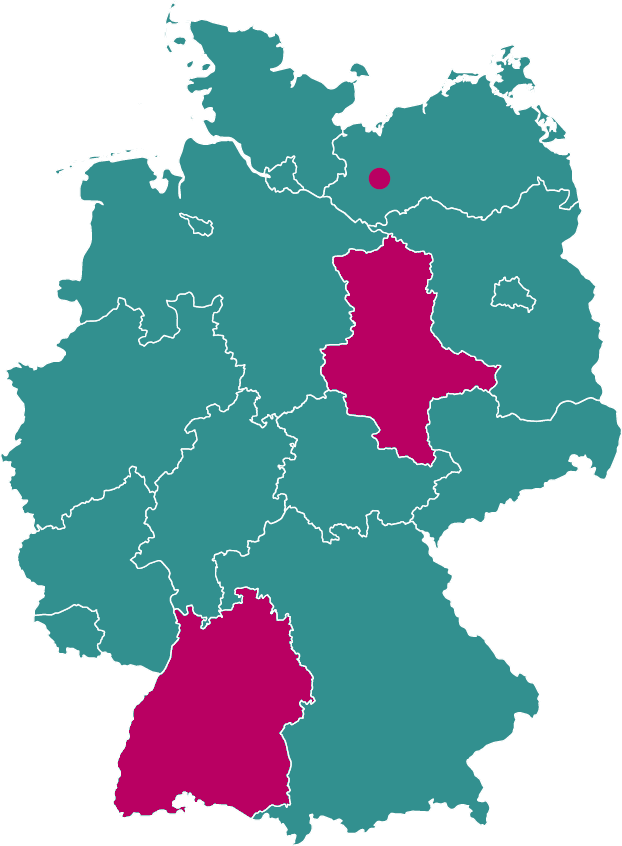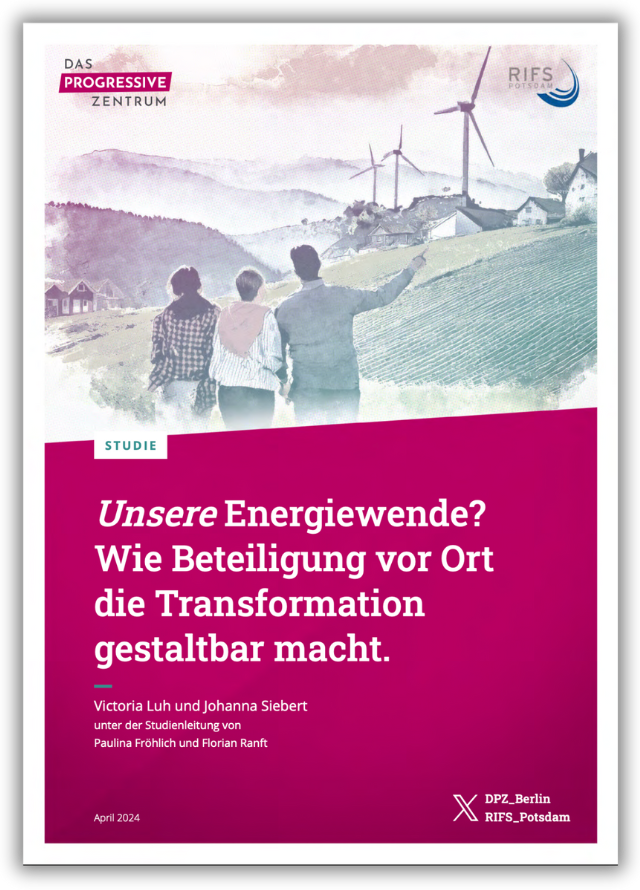A joint study by Das Progressive Zentrum and RIFS
Although a large majority of the population in Germany supports the energy transition, its implementation is fraught with conflict at the local level. While some communities roll out the red carpet for project developers in the hope of boosting town coffers, elsewhere environmental and aesthetic concerns fuel fierce opposition. The energy transition is attended by complex processes of negotiation and conflict resolution, especially at the local level, where change is most tangible. Ensuring that the course of the energy transition is guided by democratic input and that citizens share in its benefits requires expertise on the ground in towns and communities to facilitate negotiations and resolve conflicts.
In our study, we examine the challenges and success factors for various approaches to financial participation and conflict-sensitive participatory dialogue. Based on 61 interviews with project developers and stakeholders as well as affected citizens and public administration employees from almost all federal states, this research offers detailed insights into three cases. The study, titled “Our Energy Transition? How local Participation can shape Sustainability Transformations”, also identifies structural barriers and success factors for material and immaterial participation in local transformation processes.
Three case studies
Hoort 2 Wind Farm in the municipality of Hoort in Mecklenburg-Vorpommern is one example of how local authorities and citizens can share in the financial benefits of the energy transition.
Forum Energiedialog (FED) is a programme established by the state of Baden-Württemberg to support municipalities seeking to resolve energy transition conflicts through participatory dialogue.
In Saxony-Anhalt, citizen dialogues are staged as part of the state’s Structural Development Programme. Initiated by the State Chancellery in 2021, this online format aims to give citizens a voice in the setting of investment priorities targeting structural change.

Analysis
Our study shows that in order to facilitate a just transformation, we need to develop participation formats that are accessible and appealing to all and ensure they are supported by adequate administrative capacities over the longer term.
Five recommendations
Local authorities and state governments are embracing innovative approaches to material and immaterial participation to facilitate the energy transition. Nevertheless, measures to adapt to climate change as part of the broader energy transition can pose significant challenges for economically underdeveloped communities. Commitment and good ideas cannot make up for the lack of financial, human, and procedural resources that affects many local government entities. Our study offers five concrete recommendations for federal and state governments to strengthen transformation capacities in local government. These levers span three dimensions: (a) the legal environment, (b) financial support instruments, (c) participation capacities.
1. Designate transformations as a joint task: We recommend that measures to protect the climate and adapt to climate change be designated as joint tasks under Article 91a (1) of the German Constitution.
2. The “Our Energy Transition” Act: We recommend that legislation be enacted to require the financial participation of local authorities in energy transition projects and that municipal investment strategies be developed to ensure that investment returns benefit the public good.
3. Transformation Investment Fund: We recommend the establishment of a dedicated fund to facilitate the financial participation of municipalities and their involvement in the development and implementation of measures to protect the climate and adapt to climate change.
4. Transformation Facilitators: Government should fund and establish permanent positions for municipal process facilitators with expertise in the areas of financial participation and conflict-sensitive participatory dialogue. These positions should be embedded within state energy agencies.
5. Coordinate participation in transformations through an interdepartmental approach: We recommend that state administrations establish a central coordination office for participation, tasked with providing technical advice to local government and maintaining an overview of participation measures at the state and municipal levels.
Collaboration

The study was carried out in collaboration with the Research Institute for Sustainability (RIFS) and with the support of the Open Society Foundations.
Authors
The Disregarded
The idea and concept for this study emerged from the publication “The Disregarded. A study on the importance of regional perspectives for the great transformation” by the Progressive Center. As co-authors of “Die Übergangenen”, Paulina Fröhlich and Florian Ranft were in charge of the study for this project.

We develop and debate progressive ideas and bring together leading actors who turn thoughts into action. Our think tank’s goal: making the just transformation a reality. ▸ Learn more



